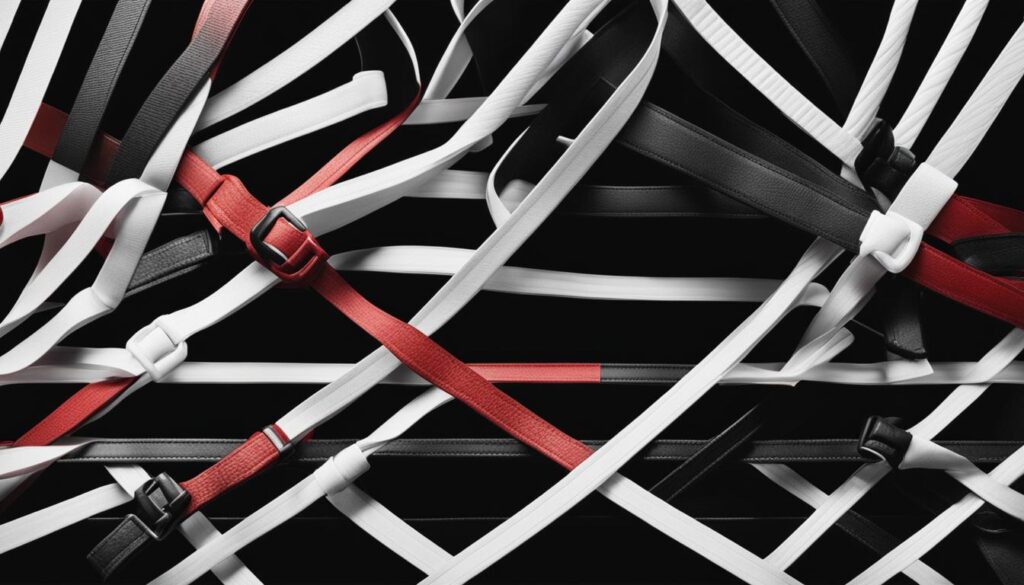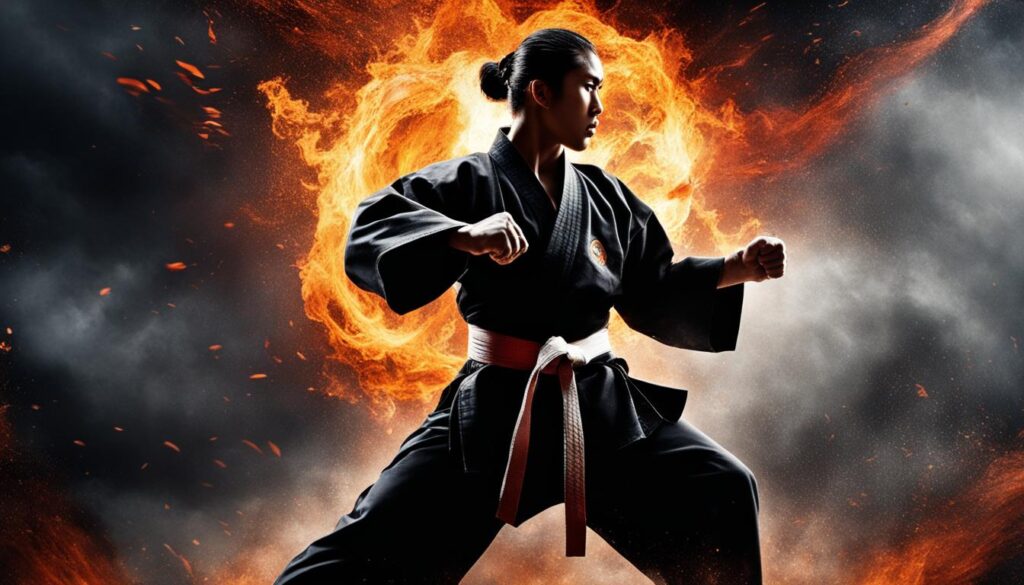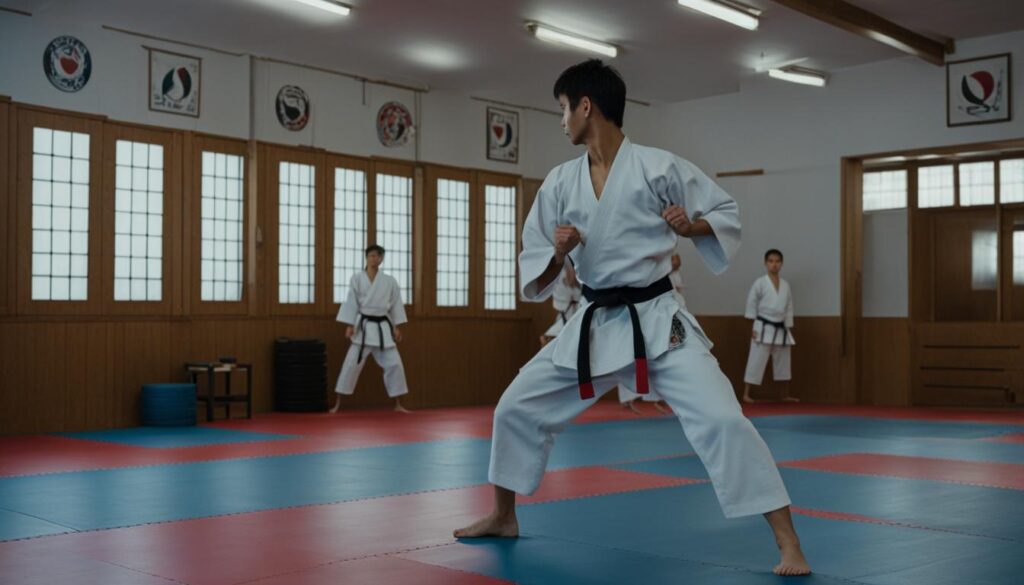Earning a black belt in karate is an impressive achievement that requires years of training and dedication. The time it takes to earn a black belt can vary depending on factors such as the martial arts discipline, the individual’s commitment and skill level, and the requirements of the karate school. While the average timeframe for earning a black belt in karate is around 5 to 10 years, some disciplines may take longer or shorter. It is important to note that earning a black belt is not the end of the journey but rather the beginning of a lifelong pursuit of knowledge and growth in the martial arts.
Key Takeaways:
- The average timeframe to earn a black belt in karate is around 5 to 10 years.
- The time it takes can vary depending on factors such as discipline, commitment, and skill level.
- Earning a black belt is the beginning of a lifelong journey in the martial arts.
- Each individual’s progress is unique, and comparisons should be avoided.
- Personal growth and dedication are essential on the path to a black belt.
What Does a Black Belt Signify in Karate?
A black belt in karate represents more than just a piece of colored fabric. It holds great significance and symbolizes the culmination of years of dedication and hard work. Earning a black belt signifies not only physical strength and skill but also mental determination and personal growth.
When someone achieves a black belt in karate, it showcases their commitment to excellence and their ability to overcome challenges. It reflects qualities such as respect, honor, discipline, and focus, which are integral to the practice of karate.
A black belt indicates proficiency in the fundamental techniques, forms (kata), and sparring of karate. It represents the ability to defend oneself and others with confidence and effectiveness.
Furthermore, a black belt carries a responsibility to uphold the values of karate and to pass on knowledge and experience to future generations. Black belt holders become role models within the martial arts community, inspiring and guiding others on their own path to mastery.
Earning a black belt in karate is not the end of the journey; it is the beginning of a lifelong pursuit of knowledge and continual growth in the martial arts.
Earning a black belt in karate signifies the culmination of years of hard work and personal growth.
Karate Belt Progression and Ranking System
The journey towards earning a black belt in karate involves progressing through a series of belts. These belts signify the student’s growth and development in the martial art, each representing different levels of skill and knowledge. Understanding the karate belt system, colors, and their meanings, as well as the requirements for each belt level, is essential for every aspiring practitioner.
The traditional karate belt system typically starts with the white belt, symbolizing the beginning of the student’s journey. As the student progresses, they move through various colored belts, each signifying increased proficiency and advancement. Common belt colors include yellow, orange, green, blue, brown, and finally black, which represents the attainment of the highest level of expertise and mastery.
The order and requirements for belt progression may vary between karate schools and styles. However, the general progression from one belt to the next is based on the student’s ability to meet specific criteria, including technical skills, forms (known as kata), sparring abilities, and knowledge of self-defense techniques. Each belt level builds upon the previous one, allowing students to develop a solid foundation and gradually expand their skills and understanding of karate.
To provide a clear visual representation of the karate belt progression, here is an example of a karate belt progression chart:
| Belt Color | Rank | Meaning | Requirements |
|---|---|---|---|
| White | 10th Kyu | Beginner | Basic stances and techniques |
| Yellow | 9th Kyu | Novice | Expanded techniques and basic kata |
| Orange | 8th Kyu | Intermediate | Advanced techniques and more complex kata |
| Green | 7th Kyu | Advanced | Refinement of techniques and higher-level kata |
| Blue | 6th Kyu | Skilled | Further technical proficiency and advanced sparring |
| Brown | 1st Kyu | Senior | Mastery of techniques and preparation for black belt |
| Black | 1st Dan | Expert | Complete proficiency in all aspects of karate |
This karate belt progression chart is meant to provide a general overview, and the requirements may vary depending on the specific karate school or style. It is important for students to consult their instructors to understand the precise requirements for each belt level in their particular karate journey.

Average Time to Earn a Black Belt in Karate
Earning a black belt in karate is a significant achievement that requires dedication and commitment. While the average time to earn a black belt in karate is around 5 to 10 years, it is important to understand that this timeframe can vary depending on various factors.
Individuals who dedicate themselves to more frequent and intensive training sessions may be able to achieve a black belt in a shorter period of time. On the other hand, personal circumstances and other commitments can extend the journey towards a black belt.
It is crucial for students to focus on their own progress and not compare themselves to others. Each person’s martial arts journey is unique, and the time it takes to earn a black belt should be viewed as a personal and transformative experience.
Ultimately, the road to a black belt is not solely about the destination but the lessons learned and personal growth achieved along the way. It is a testament to dedication, discipline, and perseverance in the pursuit of martial arts mastery.
| Martial Art | Average Time to Earn a Black Belt |
|---|---|
| Karate | Around 5 to 10 years |
| Brazilian Jiu-Jitsu | Approximately 10 years |
| Aikido | About 4 to 6 years |
| Judo | Roughly 4 to 6 years |
| Tae Kwon Do | Average of 3 to 5 years |
Black Belt Timeframes in Different Martial Arts
The journey to earning a black belt in martial arts is a testament to an individual’s commitment, discipline, and skill. However, the time it takes to achieve this coveted rank can vary significantly across different martial arts disciplines. Whether you’re considering Brazilian Jiu-Jitsu, karate, Aikido, judo, or Tae Kwon Do, it’s essential to understand the black belt timeline for each discipline.
In Brazilian Jiu-Jitsu, obtaining a black belt typically requires around 10 years of rigorous training and dedication. This martial art emphasizes grappling techniques, complex submissions, and strategic ground fighting, which contribute to its longer timeframe for black belt attainment.
Karate, on the other hand, has an average black belt timeline of 5 years. Known for its striking techniques and emphasis on discipline and focus, karate provides a well-rounded martial arts experience that culminates in the highly-regarded black belt achievement.
Aikido and judo typically require around 4 to 6 years of training to reach the black belt level. Aikido focuses on fluid movements and redirecting an opponent’s energy, while judo emphasizes throws and ground grappling techniques. Both martial arts demand patience, perseverance, and technical proficiency on the path to the black belt.
Tae Kwon Do is renowned for its relatively faster black belt attainment. With an average timeline of 3 to 5 years, this Korean martial art places a strong emphasis on high kicks, acrobatic maneuvers, and competitive sparring. Intense training and regular practice allow Tae Kwon Do practitioners to progress quickly through the belt ranks.

Understanding the various black belt timeframes across different martial arts disciplines is crucial in setting realistic goals and managing expectations. Each martial art has its own unique training methods, curriculum, and grading systems.
Whether you choose Brazilian Jiu-Jitsu, karate, Aikido, judo, or Tae Kwon Do, remember that the journey to a black belt is as rewarding as the destination itself. Commitment, perseverance, and a passion for continuous improvement are key as you embark on your martial arts journey.
| Martial Art | Average Time to Black Belt |
|---|---|
| Brazilian Jiu-Jitsu | Around 10 years |
| Karate | Average of 5 years |
| Aikido | Around 4 to 6 years |
| Judo | Around 4 to 6 years |
| Tae Kwon Do | Average of 3 to 5 years |
Factors Affecting Black Belt Timeframes
Earning a black belt in karate is a journey that is influenced by several factors. These factors can affect the time it takes for an individual to achieve their black belt. Understanding these variables can help students set realistic expectations and make a long-term commitment to their karate training.
One of the key factors that influence the timeframe for earning a black belt is the individual’s training frequency and intensity. Regular and consistent practice is essential for skill development and progression. Those who train more frequently and intensely are likely to progress at a faster rate.
Another important factor is the commitment to consistent practice. It is not only about training frequently but also about maintaining discipline and dedication over an extended period. Regular practice outside of scheduled training sessions can greatly contribute to skill improvement and a shorter black belt timeframe.
Natural aptitude and athleticism also play a role in the time it takes to earn a black belt. Some individuals may naturally be more talented or have physical attributes that make it easier for them to progress. However, it is important to note that natural ability alone is not sufficient; consistent effort and hard work are necessary to achieve a black belt.
The instructor’s teaching style and expectations can also affect the timeframe for earning a black belt. Different instructors may have different teaching methods and requirements. Some instructors may have higher standards or more rigorous evaluations, which can impact the time it takes to progress through the ranks.
The student’s ability to meet the requirements and standards of the karate school is another variable to consider. Each school may have its own specific curriculum and grading system, and students must demonstrate proficiency in techniques, forms, sparring, and other aspects of karate to advance. The time it takes to meet these requirements can vary from student to student.
Lastly, personal circumstances can also influence the training availability and time commitment for earning a black belt. Factors such as work, family responsibilities, or other commitments may limit the time and energy a student can dedicate to their karate training. It is important to find a balance that fits with individual circumstances and allows for steady progress towards the black belt goal.
Understanding these various factors can help students navigate their karate journey more effectively. By considering these variables and setting realistic expectations, students can focus on their own progress and strive for continuous improvement on the path to earning a black belt.
| Factors | How they Influence Black Belt Timeframe |
|---|---|
| Training Frequency and Intensity | Regular and intense training accelerates skill development, resulting in a shorter black belt timeframe. |
| Commitment to Consistent Practice | Dedicated and disciplined practice outside of training sessions contributes to quicker progress and a shorter timeframe. |
| Natural Aptitude and Athleticism | Having inherent talent or physical attributes can facilitate faster skill acquisition, but consistent effort is still essential. |
| Instructor’s Teaching Style and Expectations | Different instructors may have different standards and evaluation criteria, which can affect the time it takes to progress. |
| Ability to Meet School’s Requirements and Standards | Each karate school may have specific curriculum and grading systems, and students must meet the requirements to advance. |
| Personal Circumstances | Work, family responsibilities, or other commitments can impact training availability and the time that can be dedicated to karate. |
Specifics of Karate Black Belt Training Duration
The duration of training required to achieve a black belt in karate can vary based on the individual’s dedication and training frequency. On average, students who train 1 to 3 times a week can expect to earn their black belt in about 5 to 10 years. However, those who train more frequently and consistently may be able to shorten this timeframe. It is important for students to discuss their goals and expectations with their instructors to create a personalized training plan.
Karate Belt Levels and Requirements
Each karate belt level has its own set of requirements that the student must meet in order to advance to the next belt. These requirements typically include demonstrating proficiency in specific techniques, forms (kata), sparring, self-defense, and other aspects of the karate curriculum. The exact curriculum and standards may vary between karate schools and styles, but the progression from white belt to black belt involves a gradual increase in complexity and skill level.
The karate belt curriculum is designed to ensure that students develop a solid foundation of fundamental techniques and principles before advancing to more advanced levels. The requirements for each karate belt level are carefully crafted to challenge students and push them to improve their skills and abilities.
At lower belt levels, such as the white and yellow belts, the focus is often on learning basic strikes, blocks, and stances. As students progress to higher belt levels, they are expected to demonstrate more advanced techniques and combinations, as well as mastery of various katas.
Katas are a series of choreographed movements that simulate different self-defense scenarios. They serve as an important tool for refining technique, balance, and timing. Each belt level typically has specific katas that students must learn and perform with precision.
In addition to techniques and forms, karate belt requirements often include sparring and self-defense training. These components help students develop practical application skills and the ability to react appropriately in real-life situations.
It is important for students to understand that the requirements for each belt level are not meant to be easily achieved. They are meant to challenge students and push them to continually improve and grow as martial artists.
By consistently meeting the requirements for each karate belt level, students gradually progress towards the coveted black belt. The black belt represents the pinnacle of achievement in karate and is a testament to an individual’s skill, dedication, and perseverance.

Comparison with Other Martial Arts
When it comes to the time it takes to earn a black belt, different martial arts have their own unique characteristics and requirements. While karate typically takes around 5 to 10 years to achieve a black belt, other disciplines may have shorter or longer timeframes.
One martial art that often requires a longer commitment is Brazilian Jiu-Jitsu. Due to its technical complexity and rigorous evaluation process, it typically takes about 10 years to earn a black belt in Brazilian Jiu-Jitsu.
Aikido and judo also have longer average timeframes compared to karate. It usually takes about 4 to 6 years to earn a black belt in these martial arts.
On the other hand, Tae Kwon Do is known for comparatively shorter black belt attainment. Many practitioners can achieve a black belt in Tae Kwon Do within 3 to 5 years.
Each martial art has its own progression system and standards, which should be considered when comparing black belt timeframes. It’s important to research and understand the specific requirements of each martial art before embarking on the journey to a black belt.
| Martial Art | Average Black Belt Timeframe |
|---|---|
| Karate | 5 to 10 years |
| Brazilian Jiu-Jitsu | Around 10 years |
| Aikido | 4 to 6 years |
| Judo | 4 to 6 years |
| Tae Kwon Do | 3 to 5 years |
Impact of Training Intensity and Frequency
When it comes to earning a black belt in karate, the intensity and frequency of training play significant roles in determining the timeframe. Training with greater intensity and more frequent sessions can expedite skill development and progress, allowing students to achieve their black belt goal in a shorter period. However, it is important to strike a balance that takes into account the individual’s physical capabilities, available time, and overall well-being to avoid burnout or injuries.
Regular practice outside of class is also crucial for accelerating the path to a black belt. Consistent training helps reinforce techniques, build muscle memory, and refine skills. Self-reflection and a commitment to continuous improvement are essential for maximizing training efficiency and shortening the overall timeframe.
“The more you practice, the luckier you get.”
However, it is worth noting that intensity and frequency should be approached mindfully. Pushing too hard without adequate rest or recovery can lead to overtraining and hinder progress. It is essential to establish a training schedule that allows for rest days and recovery periods to optimize performance and prevent injuries.
Furthermore, finding a training routine that fits well within an individual’s lifestyle and commitments is key to maintaining consistency. By incorporating karate training into one’s daily or weekly schedule, it becomes easier to stay motivated, track progress, and steadily work towards the black belt milestone.
Remember: Strength and progress come from consistent effort and intentional training, not just sheer intensity or frequency.

The Journey Beyond the Black Belt
Earning a black belt in karate is not the end of the journey but rather the beginning of a lifelong pursuit of mastery. After achieving a black belt, students continue to learn, grow, and refine their skills in karate. The black belt represents a milestone in the journey, but it is important to approach it with humility and a desire for continuous improvement.
Black belt holders have a responsibility to pass on their knowledge and experience to future generations, while also seeking further education and development in the martial arts. The journey does not end with the black belt; it extends into a lifelong commitment to continued learning and personal growth.
“The black belt is not the end, it is the beginning. It is the beginning of understanding, the beginning of discipline, and the beginning of lifelong learning.” – George St. Pierre
Continuing to train and improve one’s skills is crucial in karate. It allows practitioners to deepen their understanding of techniques, explore new strategies, and discover their own unique style. The pursuit of mastery in karate is a never-ending process that requires dedication, perseverance, and an open mind.
It is also important for black belt holders to remain humble and approach their training with a beginner’s mindset. By continually seeking new knowledge and staying open to different perspectives, they can continuously evolve and refine their skills.
Lifelong learning in karate goes beyond physical techniques. It involves studying the philosophy and principles of martial arts, developing mental discipline and resilience, and nurturing strong moral values. Karate becomes not just a physical practice but a way of life.
As black belt holders continue their journey, they have the opportunity to inspire and mentor others who are just starting their karate path. Sharing knowledge, guiding fellow practitioners, and fostering a supportive community are important aspects of being a black belt.
In conclusion, earning a black belt in karate marks the beginning of an ongoing quest for mastery. It is a lifelong commitment to personal growth, continuous learning, and the cultivation of discipline, resilience, and integrity. The journey towards a black belt is not just about physical techniques but also about developing a strong spirit and embracing the values of martial arts.
Importance of Personal Progress and Growth
On the path to earning a black belt in karate, each individual’s progress is a deeply personal journey. It is crucial to remember that this journey should never be compared to others’. Rather, the focus should be on personal growth, improvement, and self-reflection. The pursuit of a black belt offers a unique opportunity for self-development, resilience, and discipline.
Throughout this journey, setting realistic goals is essential. By setting achievable milestones, students can celebrate their accomplishments along the way, reinforcing their commitment and motivation. Embracing the challenges and lessons that come with the pursuit of a black belt is part of the transformative process.
The path to a black belt in karate is not solely about mastering physical techniques; it is also about shaping character and cultivating inner strength. As students overcome obstacles and push their limits, they develop resilience, discipline, and mental fortitude.
Self-improvement is at the core of martial arts. The journey towards a black belt serves as a reminder that progress is not only measured by the color of one’s belt but by the depth of personal growth achieved along the way.

Conclusion
Earning a black belt in karate is a challenging and rewarding journey that requires years of dedication, discipline, and perseverance. Throughout this journey, individuals embark on a path of self-improvement, honing their skills and cultivating personal growth. The timeframe for earning a black belt can vary depending on various factors such as the martial arts discipline, an individual’s commitment, skill level, and the specific requirements of their karate school.
On average, it takes around 5 to 10 years to earn a black belt in karate. However, it is important for students to remember that the pursuit of a black belt is not a race against others, but rather a personal journey of self-discovery and development. Each person’s progress is unique, and it is essential to focus on one’s own growth and improvement rather than comparing oneself to others.
The attainment of a black belt marks the beginning of a lifelong quest for knowledge, improvement, and mastery in the martial arts. It represents not only the achievement of physical strength and skill, but also embodies qualities such as resilience, discipline, respect, and focus. With the black belt comes the responsibility to pass on one’s knowledge and experience to future generations, while maintaining a continuous desire for learning and personal betterment.
FAQ
How long does it take to get a black belt in karate?
The average timeframe to earn a black belt in karate is around 5 to 10 years.
What does a black belt signify in karate?
A black belt in karate represents years of hard work, discipline, and personal growth. It signifies physical and mental strength, honor, respect, and the ability to defend oneself and others.
What is the karate belt progression and ranking system?
The karate belt system starts with the white belt and progresses through various colored belts such as yellow, orange, green, blue, brown, and finally black. Each belt signifies different levels of skill and knowledge.
What is the average time to earn a black belt in karate?
On average, it takes around 5 to 10 years to earn a black belt in karate.
How long does it take to earn a black belt in different martial arts?
The time to earn a black belt can vary between different martial arts disciplines. Brazilian Jiu-Jitsu may take around 10 years, Aikido and Judo around 4 to 6 years, and Tae Kwon Do around 3 to 5 years.
What factors affect the timeframe for earning a black belt in karate?
Factors such as training frequency, intensity, natural aptitude, instructor’s expectations, and personal circumstances can influence the time it takes to earn a black belt in karate.
How long is the training duration for a black belt in karate?
The training duration for a black belt in karate depends on the individual’s dedication and training frequency. On average, it can take 5 to 10 years of consistent training.
What are the karate belt levels and requirements?
The exact requirements for each karate belt level may vary, but they typically involve demonstrating proficiency in specific techniques, forms (kata), sparring, and self-defense.
How does the time to earn a black belt in karate compare to other martial arts?
The time to earn a black belt can vary between martial arts. Brazilian Jiu-Jitsu usually takes longer, while Tae Kwon Do typically has a shorter timeframe compared to karate.
How does training intensity and frequency impact the timeframe for a black belt in karate?
More intense and frequent training sessions can accelerate progress and potentially shorten the time to earn a black belt in karate.
What comes after earning a black belt in karate?
Earning a black belt is the beginning of a lifelong pursuit of mastery in karate. Black belt holders have a responsibility to pass on their knowledge and continue their education and development in the martial arts.
How important is personal progress and growth in earning a black belt in karate?
Personal progress and growth are crucial on the path to a black belt in karate. It is essential to focus on individual improvement and not compare oneself to others.
What is the conclusion on the timeframe for a black belt in karate?
Earning a black belt in karate is a challenging and rewarding journey that requires years of dedication. The average timeframe is around 5 to 10 years, but it is important to focus on personal growth and improvement rather than comparing oneself to others.
